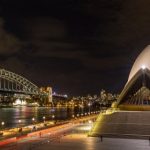History Repeats: The Parallels Between Trump and Hitler

In a 2010 interview, renowned political analyst and activist Noam Chomsky likened the political climate of the United States to that of the late Weimar Republic in Germany, right before Adolf Hitler became chancellor on January 30, 1933.
Chomsky said at that time in Germany there was “tremendous disillusionment with the parliamentary system.” The German people had lost faith in the traditional parties, leaving “a vacuum which the Nazis very cleverly” managed to fill.
The ground-breaking linguist went on to remark that the US “is extremely lucky that no honest, charismatic figure has arisen.” He outlined that if one did, the country would be in “real trouble,” due to the frustration and disillusionment amongst the populace.
According to Chomsky, if a leader like this arose, it could lead to a similar situation to when the Jews were denounced as the enemy of Nazi Germany. He foresaw in the States that “illegal immigrants and the blacks” would be labelled the nemesis and white males the “persecuted minority.”
The professor also warned that “military force” would be exalted, and people would “be beaten up.”
The rise of a potential dictator
After the election of Donald Trump last November, Chomsky’s words seem prophetic. Although many dismissed Trump as a side-show, it must be remembered that people initially made the same mistake about Hitler.
Trump’s first week in office has certainly seen illegal immigrants, as well as with Muslims, chastised as the official enemy.
In a series of what can only be described as extreme right wing executive orders, Trump has already placed a ban on nationals from seven predominantly Muslim nations from entering the country. Syrians are banned indefinitely, while Iraqis, Iranians, Libyans, Somalis, Sudanese and Yemenis have a 90 day ban on them.
Refugees are not allowed to enter the country for the next 120 days, and the building of a wall has been proposed along the Mexican border to keep out illegal immigrants.
Pressure is also being placed on sanctuary cities – places that provide safe haven to undocumented immigrants. Trump has said that if these jurisdictions don’t stop sheltering illegal immigrants and start following federal immigration laws, their police budgets will be dramatically cut.
Parallels with Adolf
Hitler also swept into power with a series of policy changes that don’t exactly mirror Trump’s, but were equally dramatic in their impact. He began to clamp down on opposition in his first week in power. Left-wing parties were banned and members of moderate parties were threatened and assaulted.
A month into Hitler’s power, a fire in the Reichstag – the German parliament – allowed the chancellor to obtain a decree that invoked Article 48 of the Weimar Constitution and “indefinitely suspended” many constitutionally protected civil liberties.
This effectively allowed the Nazis to take action against political meetings, and to arrest and kill communists.
A weekly list of crimes committed by “aliens”
Within Trump’s executive order that places restrictions on sanctuary cities, there’s a clause to the effect that he’ll be compiling a weekly list of crimes allegedly committed by immigrants.
The order claims the list will be used to “better inform the public regarding the public safety threats associated with sanctuary jurisdictions.” It will be “a comprehensive list of criminal actions committed by aliens,” which will be made public.
While the list will initially cover sanctuary cities, it will ultimately shine a negative light on immigrants as a whole and create deeper racial divisions within the already polarised nation.
Indeed, the clause does not even specify that only crimes committed by illegal immigrants will be included. The term “aliens” is used, which could lead to a situation where offences committed by legal immigrants could also be included.
The parallels here to Nazi Germany are striking. The Nazi Institute for Research on the Jewish Question kept lists of crimes committed by Jews. A Nazi Paper called the Criminal Jew published photos of Jews who had committed crimes, even those as minor as pickpocketing.
Australia’s silence sounds like support
Despite heavy criticism of the Trump administration’s Muslim ban by many world leaders – including France, the UK and Canada – Australian prime minister Malcolm Turnbull has refused to comment on the situation, insisting it’s “not his job.”
Instead, Turnbull described Australia’s immigration and border security policies as “the envy of the world’, while Australian treasurer and former immigration minister Scott Morrison said it was a sign that the rest of the world were “catching up with Australia.”
Australia’s legislative swing to the right
This rhetoric is hardly surprising coming from the Coalition government. Over recent years, it has implemented laws restricting people’s civil rights and increasing the powers of authorities to monitor the public. Many of these laws would have made Hitler envious.
Since late 2014, ASIO officers have enjoyed immunity from both civil and criminal prosecution for acts carried out in the course of “special intelligence operations.” This is mainly for anti-terrorism purposes. Officers are immune from prosecution even if they carry out raids on the innocent and commit acts of brutality.
Australia’s mandatory data retention regime came into effect on October 13, 2015. The metadata laws require telcos and internet service providers to store their customers’ metadata for the period of two years. Currently, 21 law enforcement agencies led by ASIO can access this data without a warrant.
Laws which prohibit government employees, agents and contractors from revealing abuses and corruption in government agencies have been in the Commonwealth Crimes Act for years, effectively keeping a lid on whistleblowers both here and in off-shore detention centres. The criminalisation of those who seek to expose corruption and abuse has been extended by provisions in the more recent Border Force Act.
On a state level, existing anti-protest laws have recently been strengthened, making it harder for members of the public to express dissent without fear of criminal prosecution. Anti-consorting laws have undermined the ability of people to freely associate – even with close friends and family members – and a range of police powers have been broadened, including arrest and detention powers. Police have even been given the power to perform warrantless searches.
And just last year, a number of additional restrictive laws were enacted in our state. Courts are now allowed to issue directives restricting aspects of a person’s life without proof they’ve committed a crime. While senior police were given increased powers to issue public safety orders banning people from a certain place or event for up to 72 hours every week, without the need for a court order.
The Investigative Detention Bill now allows for the detention of a suspect to prevent an act of terrorism for up to two weeks without charge. And this applies to children as young as 14.
And while many of the hundreds of new laws have been passed on the pretext of the threat of terrorism, all of us are having our basic rights and protections whittled away.
Australia following the US
Australia has looked to the United States as its greatest ally, since the British were defeated in Singapore in 1942 and then prime minister John Curtin declared that “Australia looks to America.”
As Australia has already been moving towards the far-right policy-wise for many years now, it’s not a wonder that the nation’s leaders – who’ve been instrumental in implementing these restrictive new laws – are reluctant to criticise the Trump administration’s xenophobic and divisive policies.
But the concerning question many are currently harbouring is: just how far is Trump going to take his right wing vision of the United States, and how far is Australia prepared to follow suit?
Receive all of our articles weekly
Authors

Paul Gregoire







